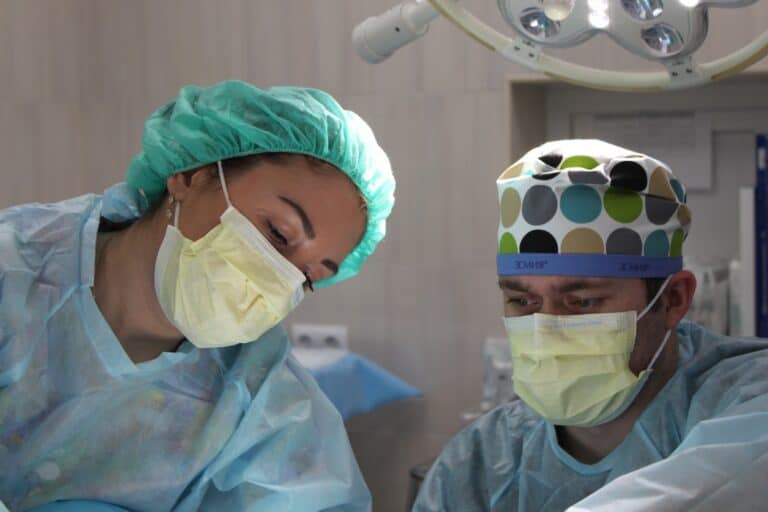Base to Bonuses: Factors Influencing Medical Device Sales Salary (2023)
This article provides an in-depth overview of the various aspects of a career in medical device sales, including roles and responsibilities, key skills and qualifications, industry growth, and factors influencing medical device sales salary expectations.
Hint: it’s not just a salary (And I wouldn’t focus too much on the salary alone…especially in an interview!). There are many components that make up total compensation, they want you incentivized to grow the business after all.
Last but not least, the article highlights how to improve salary prospects and career advancement opportunities by pursuing continued education, certifications, and networking. In essence, this comprehensive guide explores every aspect of a successful and lucrative career in medical device sales.
Overview of Medical Device Sales Professionals
A medical device sales professional is a key figure in the marketing and distribution of medical equipment and devices. These professionals are responsible for showcasing and selling products to healthcare providers such as hospitals, clinics, and private practitioners. Medical device sales representatives are an essential part of the healthcare industry, providing both information and support on products and devices that are essential for patient care.
Roles and Responsibilities
Medical device sales professionals have several responsibilities, which can vary depending on the specific position and company for which they work. Some key responsibilities include:
- Product Knowledge: Sales representatives must have a deep understanding of the medical devices they are selling. This includes the device’s functionality, benefits, and any potential risks associated with its use. They must be able to explain the product’s features and advantages to potential clients clearly and concisely.
- Building Relationships: A primary role of a medical device sales professional is to develop and maintain relationships with current and potential clients. This involves visiting healthcare providers, attending industry conferences, and participating in networking events. Building strong relationships with clients helps to ensure that they remain loyal to a specific brand and continue to purchase medical devices from the sales representative’s company.
- Generating Leads: Sales professionals must proactively seek out new clients by identifying potential leads, reaching out to prospects, and following up on referrals. They must also maintain an up-to-date client database to track contacts, sales opportunities, and customer needs.
- Negotiating and Closing Sales: A medical device sales representative is responsible for negotiating the terms and conditions of a sale with clients, which may include pricing, delivery, and product support. Once an agreement has been reached, they must finalize the sale and ensure that the client is satisfied with the transaction.
- Post-Sale Support: Once a sale has been completed, a sales professional may need to provide ongoing support to the client. This can involve troubleshooting, addressing concerns, or providing additional training on the use of a medical device.
- Monitoring Trends and Competitors: Successful sales professionals must stay informed about industry trends and new medical devices entering the market. This helps them to anticipate client needs and be better prepared to address any questions or concerns that may arise.
Key Skills and Qualifications
Medical device sales professionals must possess a unique combination of skills and qualifications to be successful in their roles. Some key skills and qualifications include:
- Education: While some entry-level sales positions may only require a high school diploma, most medical device sales professionals hold a bachelor’s degree or higher. Degree fields may vary, but common areas of study include business, marketing, or a related healthcare field.
- Experience: Previous sales experience is often preferred or required for medical device sales positions. Experience in the healthcare industry or a specific medical device field can also be advantageous.
- Networking Skills: Medical device sales professionals must be skilled at building relationships with clients, which involves creating trust and rapport through effective communication, networking, and interpersonal skills.
- Presentation Skills: Sales representatives must be able to create and deliver persuasive product presentations to potential clients, which requires excellent public speaking and presentation skills.
- Analytical Skills: A sales professional must be skilled at interpreting and synthesizing complex information related to the medical devices they sell, as well as analyzing sales data, market trends, and client needs.
- Time Management: Sales professionals must be able to manage their time efficiently to balance the demands of generating leads, building relationships, and closing sales.
Industry Growth and Stability
The medical device industry is poised for significant growth in the coming years, driven by factors such as an aging global population, advances in medical technology, and increasing demand for healthcare services. According to a report by Research and Markets, the global medical device market is expected to reach $612.7 billion by 2025, growing at a compound annual growth rate (CAGR) of 5.4% from 2018 to 2025.
This industry growth has a positive impact on the demand for medical device sales professionals, as companies will require more representatives to sell, market, and distribute their products. Furthermore, the medical device industry is known for its relative stability, owing to the essential nature of many of the products and the steady demand for healthcare services, making it an attractive career choice for those interested in long-term job security.
Overall, medical device sales professionals play a pivotal role in connecting healthcare providers with the tools and technologies they need to care for their patients. With strong growth projections in the industry and a range of essential skills and qualifications required for success, this field presents numerous opportunities for motivated individuals looking to make a difference in the world of healthcare.
Factors Influencing Medical Device Sales Salary Expectations
When it comes to medical device sales salary expectations, several factors play a significant role in determining the wages prospects of a particular job. Understanding these factors can help job seekers assess their potential income and make informed career choices. In this article, we will explore five prominent factors that influence medical device sales salary expectations: educational background, experience and expertise, geographical location, company size and market presence, and product type and complexity. Each factor is discussed in detail below, and it’s important to note that the weight of each factor may change depending on the specific job or industry.
Educational Background
The level of education and the subject of study can have a significant impact on medical device sales salary expectations. Generally, the higher the level of education, the higher the salary prospects. For instance, someone with a master’s degree or a doctoral degree will likely have higher salary expectations than someone with a bachelor’s degree. Moreover, certain subjects tend to be better-paying than others. Professionals in fields like engineering, computer science, finance, and medicine are usually associated with higher salaries. But this does not mean that other fields can’t command lucrative salaries. A strong educational foundation can open doors for various career opportunities and ensure a stable income.
Experience and Expertise
Another factor that influences medical device sales salary expectations is the individual’s experience and level of expertise in a specific field. Generally speaking, the more experience someone has, the more likely they are to command a higher salary. This is because experienced professionals have had more opportunities to develop their skills, making them more valuable to employers. Moreover, individuals with a niche or specialized skill-set tend to receive higher wages as their expertise is rarer and in high demand. In addition, relevant certifications or industry-specific qualifications can further enhance the medical device sales salary.
Geographical Location
The cost of living and overall job market in a particular area plays a significant role in determining medical device sales salary expectations. For example, job seekers in urban areas with a higher cost of living, such as New York City or San Francisco, can expect to earn more than those in smaller or more affordable cities. At the same time, geographical location also influences the demand for specific skills or industries. For instance, technology professionals might find higher-paying opportunities in tech hubs like Silicon Valley or Seattle, while finance professionals tend to receive higher salaries in financial centers like New York City or London.
Company Size and Market Presence
The size of a company and its market presence can also impact salary expectations. Larger, well-established companies often have more resources and can afford to pay their employees higher salaries compared to smaller organizations or startups. That said, smaller companies and startups might compensate for lower salaries with attractive perks like stock options, flexible work arrangements, or opportunities for rapid career advancement. Furthermore, companies with a strong market presence or a reputation for excellence in their industry may offer a higher medical device sales salary to attract top talent, while organizations with lesser-known brands might need to offer additional incentives to stay competitive in the job market.
Product Type and Complexity
Finally, the type of product or service a company offers, as well as its complexity, can influence salary expectations. Industries characterized by high levels of complexity, innovation, or regulation, such as technology, finance, or healthcare, tend to offer higher salaries. This can be attributed to the cutting-edge skill sets and knowledge required to succeed in these fields. In contrast, industries with less stringent regulatory environments or less complex products might offer lower salaries on average. However, it’s important to remember that all industries have high-paying roles, and pursuing a passion or interest in a particular field can often lead to a fulfilling and lucrative career.

Average Medical Device Sales Salary Ranges
Medical device sales professionals are involved in the selling of medical equipment and devices to healthcare organizations such as hospitals, clinics, and private practices. These professionals may work for manufacturers, distributors, or independent organizations, and they can have a crucial and rewarding impact on the healthcare system. Here, we will discuss the average salary ranges for a medical device sales salary at various experience levels, as well as how their salaries compare to those in other sales industries.
Entry-Level Medical Device Sales Salary
In the medical device sales industry, entry-level candidates generally have less than two years of experience. Their salaries may vary based on factors such as geographic location, company size, and individual qualification, but typically, they can expect to earn between $40,000 and $60,000 annually.
Some entry-level positions may include additional incentives such as bonuses and commissions that could significantly increase their total annual earnings. For example, if an entry-level medical device sales rep meets their sales targets or exceeds quotas, they might receive additional compensation in the form of a performance bonus. On average, their total earnings, including bonuses and commissions, can range from $50,000 to $85,000 per year.
Mid-Level Medical Device Sales Salary
Mid-level medical device sales professionals have more experience than their entry-level counterparts, typically boasting between two and seven years in the field. They have likely mastered the art of the sale and have gained a deeper understanding of their product offerings, as well as the healthcare market as a whole.
With this increased experience, their salaries also increase. Mid-level medical device sales professionals can expect to earn an annual base salary of around $60,000 to $100,000. When factoring in bonuses and commissions, their total annual earnings can reach up to $150,000 or more.
Senior-Level Medical Device Sales Salary
Senior-level medical device sales professionals generally have at least seven years of experience in the industry. They may have larger sales territories, manage a team of sales representatives, or take on other leadership roles within their organization. Their advanced industry knowledge and sales skills are rewarded with higher base salaries compared to their entry and mid-level counterparts.
On average, a senior-level medical device sales professional can anticipate earning a base salary of around $100,000 to $150,000 or even more, depending on their role and responsibilities. This range may even extend higher for those in management or executive positions. With bonuses and commissions factored in, their total annual earnings can exceed $250,000 in some cases.
Comparisons to Other Sales Industries
When comparing medical device sales to other sales industries, the earning potential can be quite competitive. For example, pharmaceutical sales, another popular sales segment within the healthcare sector, typically see slightly lower earnings than medical device sales. Entry-level pharmaceutical reps may earn between $40,000 and $50,000, while senior-level professionals can expect to make around $80,000 to $120,000 or more.
Sales professionals in other industries, such as technology or software sales, can also see similar earning potentials, but these salary ranges may vary depending on the complexity of the products being sold and the length of the sales cycle. Ultimately, medical device sales can be a lucrative industry for those looking to pursue a career in sales, with the potential for high earnings and the chance to make a significant impact on the healthcare system as a whole.
Benefits and Incentive Structures
Employee benefits and incentive structures are critical for attracting, retaining, and motivating a company’s workforce. Offering a range of benefits and rewards can lead to increased employee satisfaction, improved morale, and a more committed workforce. In this article, we will discuss various types of benefits and incentives that companies can offer their employees.
Commission Plans
Commission plans are a common type of performance-based incentive, primarily used in sales roles. Under a commission plan, employees earn a percentage of the revenue they generate for the company. Commission plans can motivate employees to work harder and improve their sales skills, as their income is directly tied to their performance.
There are different types of commission plans, such as straight commission, tiered commission, and draw against commission. Straight commission plans pay employees a set percentage of each sale without a base salary. Tiered commission plans provide employees with increasing commission percentages as they meet or exceed specific sales targets. A draw against commission allows employees to receive an advance payment against future commissions earned.
While commissions can be an excellent motivator for some employees, it is crucial to ensure the plan does not incentivize unethical behavior or create an overly competitive work environment.
Bonuses and Performance Incentives
Bonuses and performance incentives are financial rewards given to employees based on their job performance. These incentives can be awarded individually or as part of a team. They might be tied to specific goals, sales targets, or key performance indicators (KPIs).
Bonuses can be structured in various ways, including a flat monetary amount, a percentage of the employee’s salary, or a specific amount tied to performance metrics. Performance incentives can also take the form of non-cash rewards, such as vacations, gift certificates, or other tangible goods.
Offering bonuses and performance incentives can motivate employees to excel in their work and increase overall productivity. However, it is essential to ensure that employees understand the criteria for earning incentives and that they are attainable and fair.
Stock Options and Equity Incentives
Stock options and equity incentives are a form of ownership interest in a company, providing employees with the opportunity to participate in the company’s growth and success. Stock options give employees the option to purchase company stock at a predetermined price, while equity incentives grant company shares outright.
Stock options and equity incentives can be an attractive benefit for employees, allowing them to share in the company’s success and potentially reap significant financial gains. Additionally, they can be a powerful tool for attracting and retaining top talent, particularly in competitive industries or start-up companies.
However, it is essential to structure these incentives carefully to prevent potential issues, such as diluting existing shareholders’ ownership or creating adverse tax consequences for employees.
Travel and Expense Reimbursements
Travel and expense reimbursements are financial payments made by employers to cover employee expenses incurred while conducting business on behalf of the company. This can include airfare, hotels, rental cars, meals, and other necessary expenses.
Providing travel and expense reimbursements is essential for employees who frequently travel for work or incur business-related expenses. It demonstrates that the company values their time and efforts, and it helps to alleviate the financial burden associated with these expenses.
Companies should establish clear guidelines and processes for expense reimbursements, including what expenses are covered, approval processes, and submission deadlines.
Training and Professional Development Opportunities
Training and professional development opportunities are valuable benefits that can help employees enhance their skills, knowledge, and career prospects. These could include in-house training programs, opportunities to attend conferences or workshops, tuition reimbursement for continuing education, or access to online resources and courses.
By providing professional development opportunities, companies demonstrate their commitment to investing in employees and supporting their ongoing growth. This can lead to higher retention rates, increased employee satisfaction, and ultimately a more skilled and productive workforce.
When implementing training and development programs, it is vital to ensure that they are relevant, accessible, and appropriate for the employees. Offering a variety of options tailored to different learning preferences can help maximize the benefits of these programs.

Negotiating Salary and Benefits
Negotiating medical device sales salary and benefits can be a daunting experience, especially for those who may not have much experience in doing so. However, the process of negotiating your compensation is essential to ensuring that you are paid fairly and receive the benefits you deserve. This article will address key aspects of negotiating salary and benefits, such as researching industry standards, assessing your value and leverage, preparing for negotiations, communicating your expectations clearly, and understanding the employer’s perspective.
Researching Industry Standards
Before entering any salary negotiation, it is essential to have a good understanding of the industry in which you are working. This involves researching the average salaries and benefits for similar positions in your field and geographic location. Factors to consider include years of experience, level of education, and any additional skills or certifications that may affect your compensation.
There are several resources available to help with this research, such as job boards, industry forums, and websites that aggregate salary data. Additionally, you can consult professional associations and networking groups, as well as seek advice from friends and colleagues who have experience in the field. Understanding the industry standards will help you to develop realistic expectations during the negotiation process and will provide a solid foundation for your discussions with a potential employer.
Assessing Your Value and Leverage
In a negotiation, it is essential to understand your own value and leverage within the industry. Consider your unique skills, knowledge, and experiences that set you apart from other candidates. Differences in background and training, as well as the ability to speak multiple languages or having specialized knowledge in a particular area, can be valuable assets to an employer.
Demonstrating a successful track record or previous achievements is another way to showcase your worth, highlighting your potential to contribute positively to the organization. If you are in high demand or have multiple job offers, this can also be used as leverage when negotiating your compensation package.
Preparing for Negotiations
Preparation is essential for a successful negotiation. Begin by compiling any research you have conducted on industry standards for salary and benefits, as well as any specific data that supports your value and leverage. Next, make a list of your priorities in terms of salary, benefits, and other aspects that may affect your overall compensation package, such as vacation time or opportunities for professional development.
It is also helpful to prepare a list of questions to ask during the negotiation, as well as any counteroffers you may be willing to make. Remember that although salary is an essential component of your compensation package, it is not the only factor, and you may be able to negotiate in other areas to achieve a package that you find satisfactory.
Communicating Your Expectations Clearly
During the negotiation process, it is essential to communicate your expectations clearly and professionally. Clearly outline your case for a higher salary or additional benefits based on your research, value, and leverage. Be prepared to discuss specifics, such as citing industry standard medical device sales salary ranges or how your skills and achievements align with the compensation you are seeking.
It is also important to be flexible and open to negotiation, and not to appear too rigid or demanding. Maintaining a positive and respectful tone during the negotiation process can help keep lines of communication open and facilitate a more successful result.
Understanding the Employer’s Perspective
Lastly, it is crucial to understand the employer’s perspective during the negotiation process. Employers often have budgetary constraints, organizational policies, or market factors that influence their ability to offer higher salaries or benefits. Taking the time to listen and understand their concerns will not only make the process smoother but may also help strengthen your relationship with the employer, setting the stage for a successful working relationship in the future.
By demonstrating empathy and understanding, you can identify possible areas of compromise or generate creative solutions that meet both your needs and those of the employer. Successful salary and benefits negotiation requires a balance of both self-advocacy and empathy for the other party, working together to arrive at a mutually beneficial agreement.
Improving Salary Prospects and Career Advancement
Achieving a higher medical device sales salary and advancing your career requires an investment in yourself and your skills. Whether you are looking for more financial stability, higher job satisfaction, or additional responsibilities, there are several strategies that can help ensure your professional growth. In this article, we will discuss four major approaches to boosting your salary and advancing your career, including pursuing continued education and certifications, developing a specialized niche, building a strong network and professional relationships, and staying informed about market trends and innovations.
Pursuing Continued Education and Certifications
One of the most effective ways to increase your salary and career advancement opportunities is by continually expanding your knowledge and qualifications. Pursuing advanced degrees, professional certifications, and attending training programs can help demonstrate your commitment to continued learning and growth. Additionally, they can provide you with the skills and expertise that can differentiate you from your peers.
To determine the right educational or certification program for you, research the job requirements and qualifications for a position you aspire to achieve in the future. From that information, you will be better equipped to understand which certifications, degrees, or training programs align with your career goals. Attending industry conferences and trade shows is another way to stay informed about the latest trends and technologies, often leading to new skills and qualifications you can add to your resume.
Developing a Specialized Niche
Becoming a specialist within your field can enhance your salary prospects and open doors for career advancement. As you gain experience in your industry, consider identifying a specific niche where you can develop a high level of expertise. Being known as a subject matter expert can lead to more opportunities and recognition, as well as increased demand for your services.
To identify a niche, pay attention to the areas where you excel or have a strong interest. Speak with colleagues and mentors to get their insights on your strengths and areas where you can establish a specialization. Once you have identified your niche, continue to expand your knowledge in that area by attending specialized training programs, earning relevant certifications, and networking with professionals who share your interests.
Building a Strong Network and Professional Relationships
In many industries, who you know can be just as important as what you know. Developing a strong professional network is crucial to advancing your career and improving your salary prospects. Your network can provide you with leads on job opportunities, introduce you to potential clients, and offer valuable advice and resources.
To build your network, attend industry events such as conferences, seminars, and trade shows. Additionally, join professional organizations and industry-specific online forums to connect with like-minded professionals. Engage in networking opportunities within your company and be sure to maintain relationships with past colleagues, as they may be an invaluable resource in the future.
Staying Informed About Market Trends and Innovations
By staying up-to-date with the latest industry trends, technologies, and innovations, you will be better equipped to make strategic decisions and adapt your skills to meet the changing landscape. This can greatly increase your chances of advancing your career and earning a higher salary, as employers and clients value professionals who understand and can adapt to industry changes.
To stay informed about market trends and innovations, subscribe to trade publications and online newsletters, follow industry blogs and influencers on social media, and attend workshops or seminars. Additionally, engage in conversations with peers and colleagues to glean insights about emerging trends and technologies. By staying informed and adapting your skills to keep pace with industry changes, you will be in a better position to seize opportunities for career advancement and a higher salary.
Frequently Asked Questions
1. What is the average medical device sales salary for Sales Professionals in the United States?
The average salary for Medical Device Sales Professionals in the United States is approximately $75,000 per year. Depending on the company, location, and experience, salaries can range between $50,000 for entry-level positions to over $150,000 for top-level sales executives.
2. Can bonuses and commissions impact the earning potential of Medical Device Sales Professionals?
Yes, bonuses and commissions can greatly impact the earning potential of Medical Device Sales Professionals. On average, these additional compensations can add $30,000-$50,000 or more to a salesperson’s annual income, making total annual earnings reach well over $100,000.
3. How do Medical Device Sales Professionals compare to other types of sales positions in terms of salary?
Medical Device Sales Professionals often earn higher salaries compared to other sales positions. This is due to the specialized nature of the industry, the complexity of the products, and the extensive knowledge required to successfully sell medical devices to healthcare providers.
4. Are there any factors that may affect medical device sales salary?
Several factors affect salary expectations, including years of experience, location, company size, and educational qualifications. Professionals with more experience and advanced degrees may command higher salaries, while those in regions with higher living costs can also see increased compensation.
5. Is a career in medical device sales a good choice for professionals seeking high-income potential?
Yes, a career in medical device sales is an excellent choice for professionals seeking high-income potential. With solid base salaries, generous commission structures, and ample opportunities for career growth, medical device sales can provide a rewarding and lucrative career.
6. What are some ways that Medical Device Sales Professionals can increase their salary?
By focusing on skill development, networking, and acquiring industry certifications or advanced degrees, Medical Device Sales Professionals can increase their salary. Demonstrating a history of success, building relationships with key clients, and staying current on industry trends also contribute to higher income potential.
Conclusion
Medical device sales can be an attractive and lucrative career path for those with the right skills, qualifications, and ambition. While salary is undoubtedly an essential component of total compensation, it’s crucial to consider other factors such as commission plans, employee benefits, and incentive structures when evaluating job opportunities.
This comprehensive guide has explored every aspect of a successful and lucrative career in medical device sales, from the roles and responsibilities of sales professionals to the factors influencing salary expectations, such as education, experience, geographical location, and company size. We’ve also taken a closer look at the average salary ranges for entry-level, mid-level, and senior-level sales professionals.
Moreover, this guide has reinforced the importance of employee benefits and incentive structures in attracting, retaining, and motivating a company’s workforce. Commission plans, bonuses, stock options, equity incentives, and travel and expense reimbursements are typical types of incentives that companies can offer to their employees.
Finally, we’ve discussed how professionals can improve their salary prospects and career advancement opportunities by pursuing continued education, developing a specialized niche, building a strong network and professional relationships, and staying informed about market trends and innovations.







One Comment